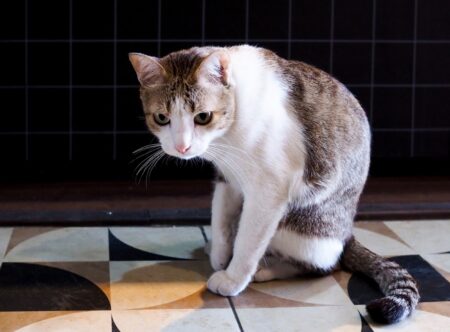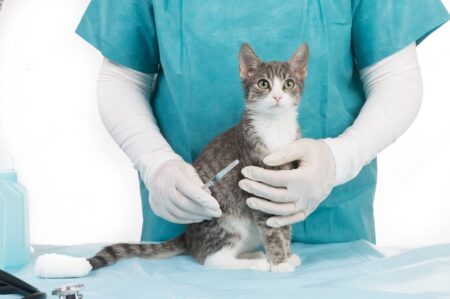When To Put A Cat To Sleep With Hyperthyroidism?
Hyperthyroidism is a common medical condition in cats and is caused by an overactive thyroid gland producing too much of the thyroid hormone (T4). If left untreated, a cat with hyperthyroidism can experience a wide variety of medical complications including high blood pressure, rapid and irregular heartbeat, kidney failure, and even death. If a cat’s hyperthyroidism becomes severe or is not responding to medication, it may be necessary to euthanize the cat. Euthanasia should be considered when the cat’s quality of life is significantly decreased and it is no longer responding to treatment or pain-relieving medications. Deciding to put a cat to sleep is a difficult decision and should only be done with careful consideration and counsel from the animal’s veterinarian.
When To Put A Cat To Sleep With Hyperthyroidism?
The decision to euthanize a cat with hyperthyroidism is not one to be taken lightly. Ultimately, the decision should be made with your veterinarian’s guidance, based on the cat’s quality of life. Euthanasia is generally recommended if the cat is no longer responding to medications or treatments, is in extreme pain or suffering, is unable to eat and drink, or is prone to life-threatening complications. If the cat does respond to medications, the cat may be able to live a long and healthy life. However, in some cases, long-term use of medication can lead to significant side effects.
What Is Hyperthyroidism In Cats?
Hyperthyroidism is a common endocrine disorder in cats, caused by an overactive thyroid gland. It occurs when the cat’s thyroid gland produces too much of the hormone, thyroxine. This can cause an increase in the cat’s metabolism, resulting in symptoms such as weight loss, increased appetite, increased thirst, hyperactivity, increased vocalization, hair loss, and an unkempt coat. If left untreated, it can lead to serious health complications such as congestive heart failure, kidney disease, and an increased risk of developing other infectious and non-infectious diseases.
Are Some Cats More Prone To Hyperthyroidism?
Yes, some cats are more prone to hyperthyroidism. Elderly cats in particular are at higher risk, as the disease is most common in cats over 10 years of age. Additionally, cats who are overweight or eat a highly processed diet may be more susceptible to hyperthyroidism.
What Is the Life Expectancy of a Cat With Hyperthyroidism?
The life expectancy of a cat with hyperthyroidism can vary greatly, depending on the severity of the condition and the cat’s response to treatment. On average, cats can live 4-6 years with hyperthyroidism if they undergo proper medical care and receive hormone therapy. Some cats with milder cases of the disease can return to a normal life span.
Things To Consider On When To Put A Cat To Sleep With Hyperthyroidism
- Quality of Life: Hyperthyroidism affects a cat’s quality of life in many ways, including increased thirst and appetite, weight loss, aggressive behavior, excessive vocalization, frequent urination, nausea, diarrhea, and vomiting. If these symptoms significantly reduce your cat’s quality of life, it may be time to consider putting it to sleep.
- Age: Older cats are more likely to suffer from hyperthyroidism, so age should be taken into consideration when you’re weighing the decision to put your cat to sleep. If your cat is elderly with other health issues, you may want to strongly consider it.
- Response to Treatment: Hyperthyroidism can be successfully managed with medication, diet changes, and thyroidectomy in some cases. If your cat’s condition does not respond well to treatment or if the side effects of the medication are too severe, it may be time to consider euthanasia.
- Cost: While some forms of treatment for hyperthyroidism are covered by pet insurance, it can also be costly to treat, and depending on your cat’s health, the treatments may not even be successful. Keeping an eye on your finances and the long-term costs of treating hyperthyroidism can help you make the best choice for your cat.
- Quality of Veterinary Care: For the best possible outcome for your cat, you should seek out a veterinarian with experience in treating hyperthyroidism. Make sure you feel comfortable with the care your cat receives and the advice you get from your vet when making the decision to put your cat to sleep.
Hyperthyroidism In Cats Eyes
Hyperthyroidism in cats’ eyes is a condition caused by the overproduction of thyroid hormones, which can cause symptoms such as weight loss, increased appetite, vomiting, diarrhea, increased heart rate, irritability, increased thirst and urination, and an enlarged thyroid gland (goiter). In some cases, cats may also develop vision problems, such as squinting and a reduction in the size of the pupils. The pupils can also become very sensitive to light, allowing for easier detection of this disorder. Additionally, hyperthyroidism in a cat’s eyes can cause damage to the eye itself, including retinal detachment, cataracts, and uveitis. Treatment of hyperthyroidism in cats is usually done with anti-thyroid medications, most commonly methimazole. Surgery can also be used to remove affected thyroid tissue.
SEE ALSO: When To Euthanize A Cat With Feline Leukemia?
15-Year-Old Cat With Hyperthyroidism
Hyperthyroidism is a common condition in cats, especially as they age. It is caused by an overactive thyroid gland that produces too much of the hormones T3 and T4. 15-year-old cats with hyperthyroidism may experience an increased appetite, weight loss, vomiting, diarrhea, and increased drinking and urinating. They may also exhibit changes in behavior, such as restlessness, aggression, and increased vocalization. Treatment for animals with hyperthyroidism typically involves antithyroid medications or radioactive iodine therapy. In some cases, surgery may be necessary to remove the affected thyroid gland. Proper monitoring and early diagnosis are key to managing the condition and minimizing symptoms.
What Are The Symptoms Of Hyperthyroidism In Cats?
Common symptoms of hyperthyroidism in cats include:
- increased appetite
- weight loss
- increased drinking
- increased urination
- vomiting
- diarrhea
- lethargy
- hair loss
- hyperactivity
- aggressive behavior
- increased vocalization
- increased shedding
- diabetes-like symptoms, such as increased thirst and urination
Symptoms Of Late-stage Hyperthyroidism In Cats
- Weight loss and muscle wasting
- Increase in heart rate
- Pain in the eyes, difficulty concentrating
- Vomiting and diarrhea
- Loss of appetite
- Depression and irritability
- Excessive thirst and urination
- Shedding of excessive amounts of fur
- Unkempt coat and rough hair
- An increased amount of vocalization
Cat Thyroid Symptoms Meowing
A symptom of an overactive thyroid in cats is excessive meowing. When a cat’s thyroid is overactive, its metabolism is increased, which can often cause them to become over-excited and vocalize more than usual. They may meow more frequently, more loudly, and be more vocal in general than usual. Other common symptoms of an overactive thyroid in cats can include increased cravings for food, weight loss, and restlessness.
How Often Should You Feed A Cat With Hyperthyroidism?
The amount and frequency of feeding will depend on the individual cat with hyperthyroidism. Ultimately, it should be decided in conjunction with your veterinarian. It’s important to feed your cat multiple small meals throughout the day as opposed to one or two large meals. This will help regulate their blood sugar levels and prevent overeating. Additionally, you may want to talk to your veterinarian about providing meals that are low in calories, high in protein, and fortified with essential vitamins and minerals.
Can Hyperthyroidism In Cats Be Treated? How to Treat It?
Yes, hyperthyroidism in cats can be treated. Treatment options include anti-thyroid medications, radioactive iodine therapy, and surgical removal of the affected gland. Depending on the type and severity of the hyperthyroidism as well as the age and overall health of the cat, the veterinarian will determine which treatment is appropriate. Generally, anti-thyroid medications are the first line of treatment to reduce the levels of thyroid hormones in the blood, but when that fails, radioactive iodine is used to destroy the thyroid cells directly and can provide a permanent form of treatment.
How Long Can A Cat Live With Hyperthyroidism With Treatment?
With proper and timely treatment, cats with hyperthyroidism can live full and happy lives – often for many years. With proper management, cats can easily reach well into their late teens and even early 20s.
How Long Can A Cat Live With Hyperthyroidism Untreated?
Hyperthyroidism is a chronic condition, so once it is diagnosed, it must be managed over the long term. If untreated, hyperthyroidism can have a dramatic impact on a kitty’s health. Hyperthyroidism can cause kidney failure, heart failure, and damage to other organs. Moreover, if left untreated, it can be fatal in cats. With proper treatment, most cats can experience a healthy life for many years. With medical care, the majority of cats with hyperthyroidism have an average life expectancy of at least 4 to 8 years.
How Do Cats Die From Hyperthyroidism?
Cats can die from hyperthyroidism due to complications from the disorder. These can include high blood pressure, congestive heart failure, and kidney failure, all of which can lead to death. Hyperthyroidism can also cause severe weight loss, making the cat more vulnerable to secondary infections, such as pneumonia and other respiratory problems, that can also lead to death. Finally, some cats simply become so ill from the symptoms of hyperthyroidism that they simply succumb to the disease.
SEE ALSO: Do Rottweilers Growl When Happy?
FAQ
Q. When should a cat with hyperthyroidism be put down?
A. It is generally not necessary to put a cat with hyperthyroidism down. With proper treatment, cats can live full and happy lives with this condition. If the cat’s condition becomes unmanageable or if the cat is elderly and is suffering from other serious health issues, then euthanasia may be considered.
Q. Does sleep help hyperthyroidism?
A. No, sleep does not directly help with hyperthyroidism. However, getting enough quality sleep can help reduce symptoms of hyperthyroidism, such as fatigue, irritability, difficulty concentrating, and insomnia. Effective treatments for hyperthyroidism include taking medications, undergoing radioactive iodine therapy, and/or having surgery to remove all or part of the thyroid.
Q. Is my cat in pain with hyperthyroidism?
A. It is possible that your cat may be in pain due to hyperthyroidism. Common signs of hyperthyroidism-related pain include decreased appetite, weight loss, drooling, and vocalization. If you are concerned that your cat is in pain, we recommend consulting with your veterinarian.
Conclusion
In conclusion, when it comes to deciding when to put a cat to sleep with hyperthyroidism, it ultimately comes down to the cat’s symptoms and quality of life. If the cat’s health is declining rapidly and there is no quality of life left, then it may be time to let them go. As always, it is important to consult a veterinarian before reaching any decisions about euthanizing a pet.


